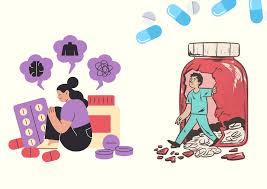Addiction is an emotional, mental, and physical struggle that can affect every aspect of an individual’s life. Whether it’s alcohol, opioids, prescription drugs, or other substances, the road to recovery can seem overwhelming. But, while the path is challenging, it is not without hope. drug and alcohol rehab offers individuals a chance to regain control over their lives and emotions, and ultimately, find peace and healing.
The emotional journey through rehab is often filled with ups and downs. The process is not just about physical detoxification; it also involves confronting deep-seated emotional issues that may have contributed to the addiction. Understanding the emotional stages of recovery can help individuals and their loved ones prepare for what lies ahead, providing a sense of clarity and compassion through the process.
The Initial Shock: Entering Rehab
For many individuals, the emotional journey through rehab begins with a mixture of fear, confusion, and reluctance. Admitting that one has a problem with addiction is never easy, and entering a treatment facility may feel like a daunting step into the unknown.
The initial shock of entering rehab can bring feelings of helplessness and overwhelm. The environment is often unfamiliar, and the individual may be separated from their usual support system, which can increase feelings of isolation. The withdrawal symptoms from the substance also add an emotional and physical burden, leading to feelings of discomfort and uncertainty.
However, it’s important to remember that this stage is temporary. The uncertainty eventually gives way to understanding and a sense of direction. Support from medical professionals, therapists, and peers in the rehab community provides comfort and reassurance, offering individuals the emotional support they need to move forward.
Detoxification: The First Emotional Hurdle
Detoxification, the first phase of rehab, is where the body eliminates harmful substances. It is necessary for long-term recovery but can be one of the most emotionally difficult stages of rehab.
As the body adjusts to the absence of the substance, withdrawal symptoms can range from physical discomfort to emotional upheaval. Anxiety, depression, irritability, and mood swings are common during detox, as the brain chemistry begins to adjust to the absence of the substance.
During this phase, individuals may feel emotionally fragile and vulnerable. This is a critical time to have access to professional support and counseling. Medical staff can monitor symptoms and offer medications or interventions to ease physical withdrawal, but the emotional toll is often harder to address. Learning to accept these difficult emotions, while staying focused on the goal of recovery, is essential in overcoming this stage.
Self-Reflection: Confronting the Past
Once detoxification is complete, individuals begin the process of self-reflection, where they confront the emotional and psychological reasons behind their addiction. This stage is often marked by a deep dive into personal history, experiences, and trauma.
For many people, addiction isn’t just about the substance—it’s about the emotional pain they’ve been masking. Grief, guilt, shame, and anger often surface during this stage. Confronting past trauma, whether it’s childhood abuse, a difficult breakup, or the loss of a loved one, can be incredibly painful but also a crucial part of healing.
Therapy plays a pivotal role at this stage, as individuals work with trained counselors to explore the root causes of their addiction. Cognitive Behavioral Therapy (CBT), Dialectical Behavioral Therapy (DBT), and other therapeutic modalities help individuals reframe negative thought patterns and gain insight into their behavior. Through this process, they begin to understand why they turned to substances in the first place and begin to replace unhealthy coping mechanisms with healthier ones.
During self-reflection, individuals may experience emotional breakthroughs that bring them to tears, but these moments can also be incredibly liberating. It is not uncommon for people to feel both a sense of sadness and hope during this stage. The key is recognizing that while confronting the past can be painful, it is a necessary step toward healing.
Guilt, Shame, and Forgiveness
As individuals progress through rehab, they often experience feelings of guilt and shame—two emotions that can be especially difficult to work through. Many individuals feel guilty for the harm their addiction has caused to themselves and their loved ones. Shame often follows, as individuals may feel that they are somehow “less than” or unworthy of love and success because of their addiction.
Rehab is a place where individuals can work through these feelings and learn the importance of self-forgiveness and compassion. Counseling, support groups, and peer sharing can help individuals understand that addiction is a disease, not a moral failing. Through these resources, individuals are able to build healthier self-esteem and begin to forgive themselves for past mistakes.
Support groups, such as Alcoholics Anonymous (AA) or Narcotics Anonymous (NA), provide a safe space for individuals to share their experiences, acknowledge their guilt, and begin the process of self-compassion. These groups offer a sense of solidarity, showing individuals that they are not alone in their struggles, and that recovery is possible.
Building Emotional Resilience: Strengthening Coping Mechanisms
As rehab progresses, individuals move from confronting their past to building their emotional resilience for the future. One of the primary goals of rehab is to help individuals develop healthy coping strategies to deal with stress, triggers, and emotions in a way that doesn’t involve substances.
At this stage, individuals often begin to experience a shift in their emotional well-being. They start to feel empowered and hopeful about the future. Therapy focuses on helping individuals recognize the tools they now have to cope with life’s challenges without turning to drugs or alcohol. Mindfulness, meditation, and breathing exercises are commonly taught to help individuals stay grounded during stressful situations.
Building emotional resilience also means cultivating emotional intelligence, or the ability to recognize, understand, and manage emotions in a healthy way. With the help of counselors and support groups, individuals begin to learn how to express their emotions constructively and engage in positive self-talk.
Preparing for Life After Rehab: Moving Beyond Addiction
As rehab nears its end, the emotional focus shifts to preparing for life after treatment. Individuals are taught how to navigate life without relying on substances, how to manage stress and triggers, and how to build a network of sober support. During this stage, many individuals experience a sense of renewal, realizing they are stronger than they once believed.
The transition to life outside of rehab can bring about a mix of emotions, including excitement, anxiety, and fear. Relapse prevention techniques and continued therapy help individuals address these feelings, ensuring that they have the emotional tools necessary to succeed in their long-term recovery.
Conclusion: A Journey of Healing and Hope
The emotional journey through drug and alcohol rehab is not easy, but it is one of the most rewarding and transformative experiences a person can go through. Rehab is not just about stopping substance use—it’s about healing the mind, body, and spirit. Throughout the emotional highs and lows, individuals gain the tools and resilience they need to live a life of sobriety and wellness.
If you or someone you love is ready to begin the emotional journey toward recovery, take the first step today. Hope, healing, and transformation are within reach, and a brighter future is waiting. Through rehab, you can reclaim your life and discover the emotional peace and strength that come with recovery.

